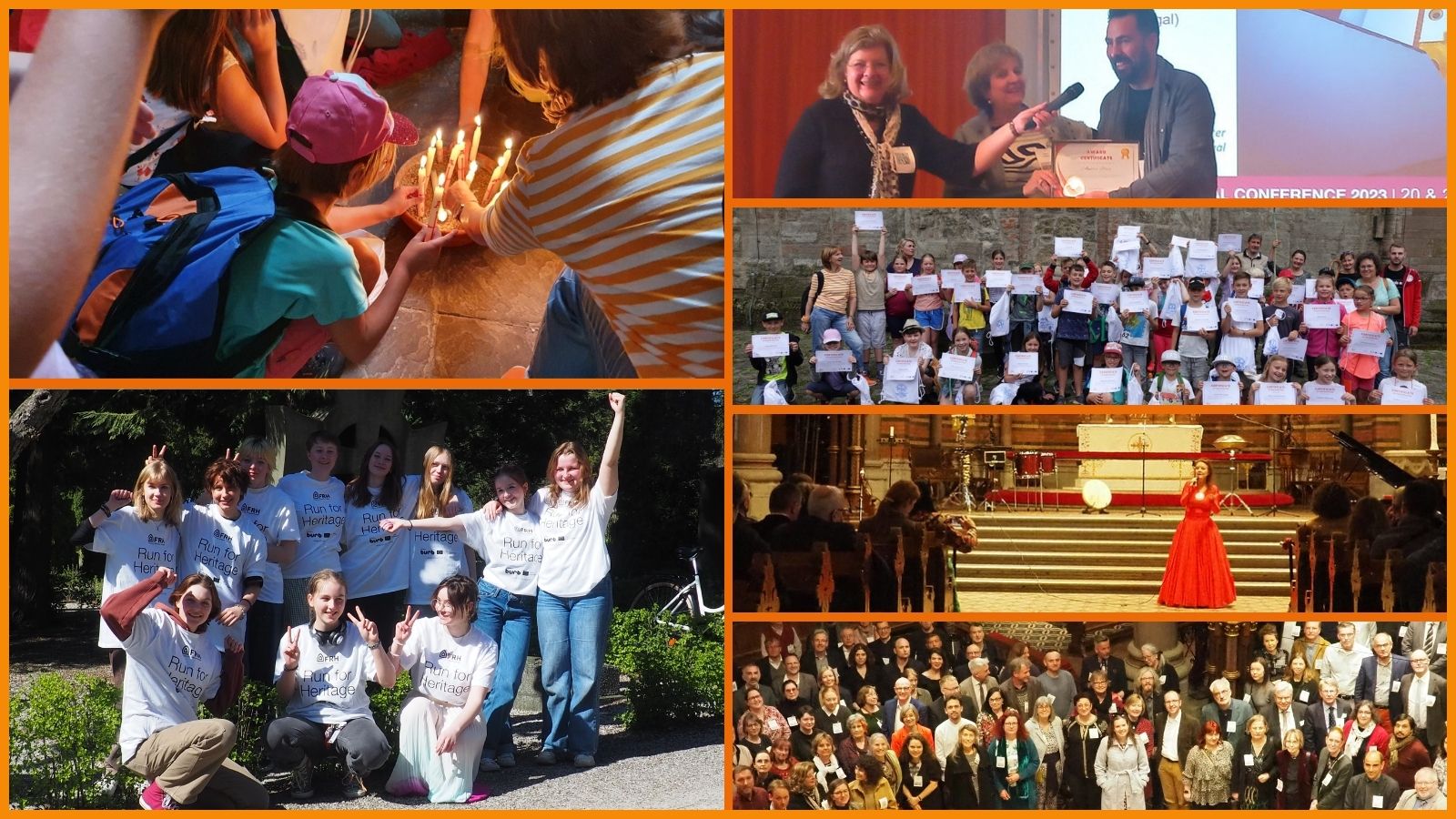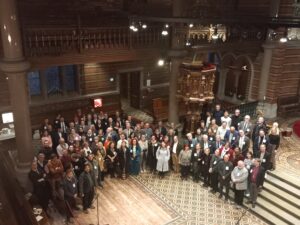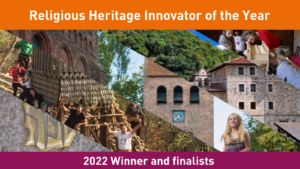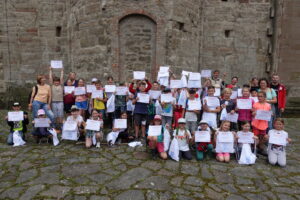Securing a future for religious heritage is a challenge that cannot be met without the commitment and support of European society. As the only European network for the safeguarding of historic places of worship, FRH’s aim is to provide a platform where organisations, professionals and citizens can connect and advocate to develop viable solutions to present and future challenges. But how exactly do we do this? Here is what we have done so far in 2023!

Committed with heritage crafts in the European Year of Skills
Heritage-related professions are often vocational and young people are not always aware of them as possible career opportunities. Nevertheless, our historic churches, synagogues, mosques and other worship buildings need skilled professionals in well-known disciplines such as carpentry or stonework, as well as in very specific ones such as the painting and restoration of stained glass, the manufacture and installation of bells, the repair and maintenance of pipe organs, etc. In the European Year of Skills, our network wants to draw attention to those skills that are indispensable in the restoration and preservation of religious heritage!
In order to showcase the wide range of heritage disciplines and their impact on both heritage and society we organised in May an FRH Talk with the Heritage Crafts Association. Every two years, this UK association publishes an updated list of endangered heritage crafts. The 2023 List of Endangered Heritage Crafts includes some important professions for religious heritage such as bell founding (critically endangered), mechanical organ making (endangered), or historic stained glass window making and restoration (endangered). You can watch this session again here.
Throughout this year we also want to share the concerns and show the day-to-day work of craftspeople working in heritage buildings through a series of interviews in collaboration with Mad’in Europe. Go to this section to find interviews with 12 craftsmen from all over Europe. We will come back with new interviews in September!

FRH Biennial Conference 2023 in Lund, Sweden. Photo: FRH
Sustainability at the heart of the FRH Biennial Conference 2023
On 20 and 21 April we held our 2023 Biennial Conference, the first in person conference since Paris 2018, organised with the support of our member and local partner, the Diocese of Lund. The event brought together 114 participants from 20 countries in Lund, home to one of the oldest cathedrals in Scandinavia and the first seat of the bishopric of Sweden and the Nordic countries.
It was an opportunity for FRH members to meet again and connect with new professionals and academics from Europe and beyond to discuss one of the most pressing issues threatening the future of heritage: sustainability. Over the course of four days, leading experts from diverse heritage-related disciplines addressed the issue of the sustainability of religious heritage from four different perspectives: economic, ecological, cultural/spiritual and social.
You can refresh your memory here or check other resources from the conference below:

Religious Heritage Innovator of the Year. Photo: FRH
Celebrating creativity and innovation
Responding to today’s challenges requires a capacity that European organisations have been able to demonstrate, through our Religious Heritage Innovator of the Year award. The first Innovator of the Year awards ceremony took place during the Lund Conference, where the five projects selected in the first edition were recognised and presented to the audience.
Present at the ceremony were the winner, Lydia Vroegindeweij, with her project Orgelkids for the introduction of the pipe organ in the classroom; the volunteers of Ambulance for Monuments, which provides “first aid” to endangered monuments in Romania, including many wooden churches; and the promoters of the School Church project, which has transformed the former church in Garmerwolde (The Netherlands) into a vibrant educational space. The first edition of the award also recognised the Lebaniego Digital 4.0 project, the world’s first interconnected pilgrimage route in the world; and the Jewish Virtual Tourism, which started offering live virtual tours in response to tourism restrictions caused by the coronavirus.
It is not just projects that inspire others. Images are very powerful when demonstrating cultural heritage’s importance in society. The winner and the eight finalists of the FRH Photo Competition are an excellent visual journey through the architecture and religious traditions of Europe and the world. Check them out in the Photo Competition booklet!

Participants of the Run for Heritage in Ilsenburg, Germany, holding their certificates. Photo: Wernigerode Tourismus GmbH
Youth in the spotlight
The European Year of Youth was an exceptional occasion to give young people a say, but our commitment to youth didn’t end with it. At FRH we continue to focus our efforts on highlighting the essential role of young people in safeguarding and keeping our cultural heritage alive.
The first FRH Talk of 2023, “Young Voices in Religious Heritage” featured three young professionals from Singapore and the Netherlands. This webinar was organised in collaboration with the youth-led organisation ESACH (European Students’ Association for Cultural Heritage). If you missed the wonderful projects and research work presented by Arpichart Kittimethaveenan, Ankie Petersen and Eva Langerak, you can watch them here.
Our Biennial Conference 2023 also gave the floor to young speakers and included a session focusing on youth entitled “Young Voices in Heritage” and presented by Samidha Pusalkar, external programmes coordinator at ESACH and member of the FRH Scientific Committee. Click here to see the slides.
This year we have also celebrated two Run for Heritage activities: the first one took place in Lund, Sweden, right before the start of the Biennial Conference and gathered a group of teenagers for a bike orientation in which they visited several cemeteries of this charming university town in collaboration with the BURB project for children’s and young people’s right to cemeteries; the second took place in the wonderful scenery of the Harz Valley, in Germany, and took a group of 40 children from the 3rd and 4th grades from Ilsenburg on a pilgrimage trail from their town to Drübeck to discover the excellent monastic heritage of this region in a playful way.
If you want to hear stories from young professionals, don’t miss our Summer Instagram takeovers in collaboration with European Heritage Volunteers. We have already sneak in virtually in the restoration of the Moravian Cemetery in Hamelin, Germany; the conservation of traditional lime plasters at the Mauerbach Charterhouse in Austria (former Carthusian monastery); and the conservation of historic plasters at the former synagogue in Halberstadt, Germany.

Religiana website. Photo: FRH
Religiana, an expanding portal for discovering Europe’s religious heritage
Back in 2017, FRH embarked on a new project with a lot of enthusiasm and a great challenge ahead: to build the largest tourist portal of religious buildings in Europe. Throughout the years, this collaborative database of religious sites which we called Relgiana has grown progressively with contributions from our partner organisations and individuals from across the continent. Today we are proud to offer tourist information on more than 8,800 sites for free.
Do you want to support this project? You can do it by making a donation or uploading a new building!
What is coming up?
We still have many activities and campaigns ahead of us in which our members and anyone interested preserving and promoting our religious heritage can participate.
Are you a member of FRH? Save the date for the 2023 Annual General Meeting, and look out for the opening of registration for our next face-to-face meeting in Naumburg, Germany.
Not a member yet? There are a million ways you can collaborate with us: register for our upcoming FRH Masterclass and meet us in Germany, introduce yourself and your expertise by writing a feature article for our newsletter, send a photo to the FRH Photo Competition 2023, apply to the Religious Heritage Innovator of the Year, organise a Run for Heritage in your town, or consider joining the network and connect with more than 200 members.
We wish you a refreshing holiday! See you soon!





Follow us: